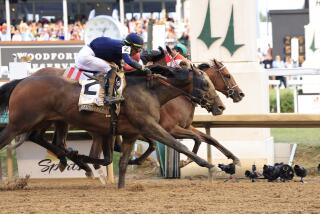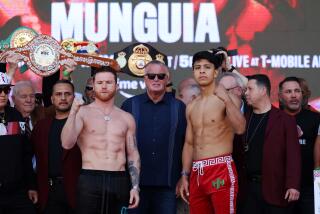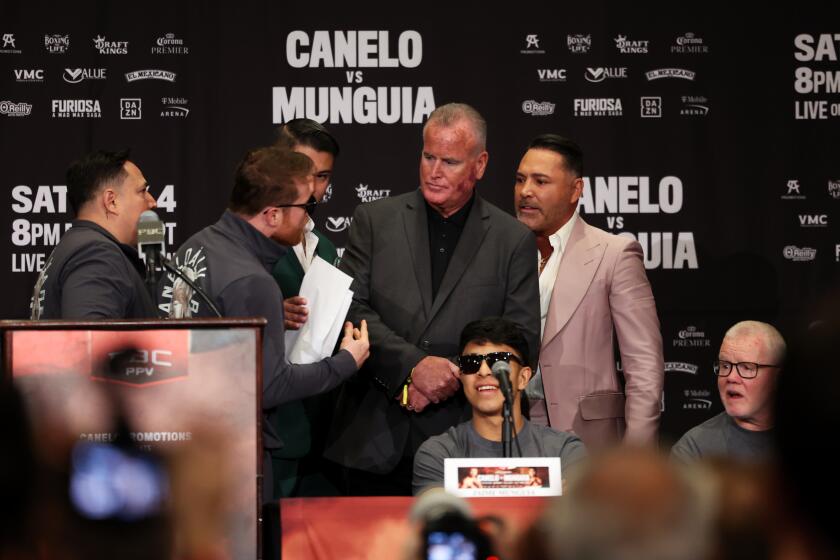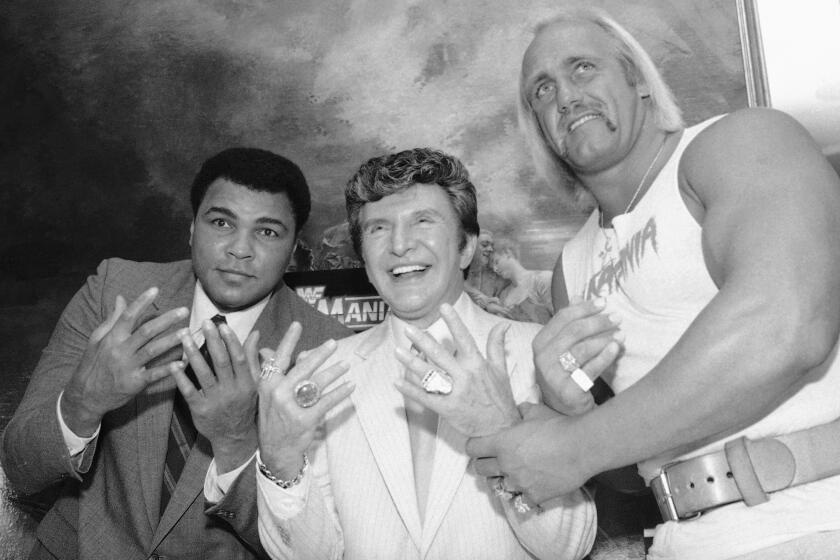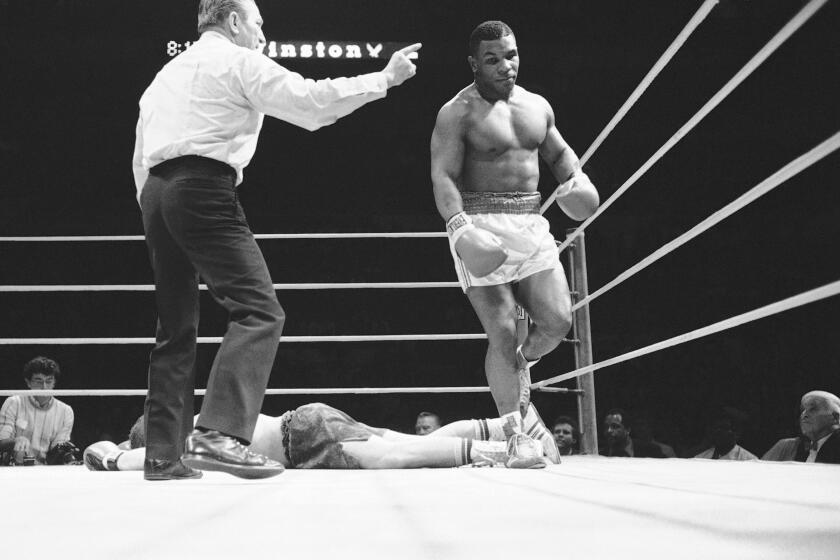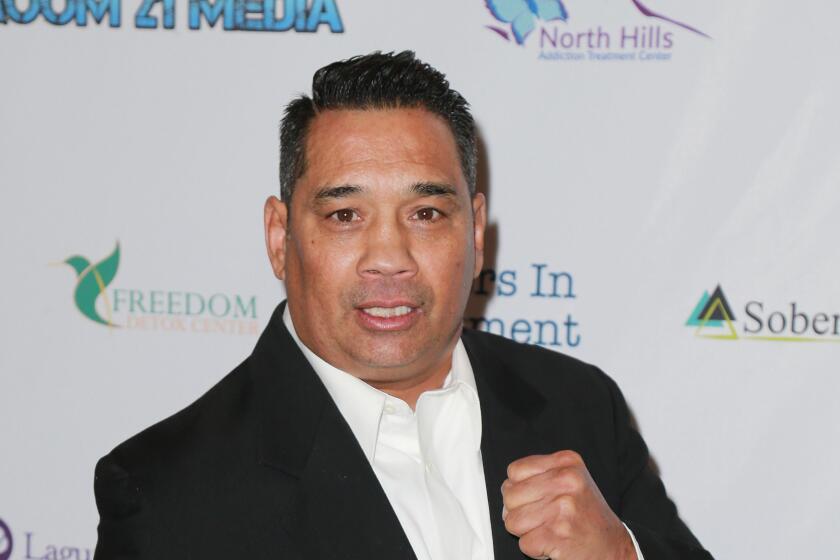BELOW THE BELT
“And in this corner, the heavyweight champion of the world.”
That’s all that needed to be said.
That’s all it took to introduce Jack Johnson, Jack Dempsey, Joe Louis, Rocky Marciano and the others who ruled the division from the late 1800s into the mid 1960s.
Even with Sugar Ray Robinson, Henry Armstrong and the other great champions of the lower divisions, no ring announcer ever introduced them as “the undisputed champion.”
What was there to dispute? Championships changed hands in the ring.
But try telling that to Lennox Lewis. And then hold your ears.
With the World Boxing Council title belt already around his waist, Lewis figured that, by beating Evander Holyfield, the World Boxing Assn. and International Boxing Federation champion, last November, he was the undisputed champion.
How naive.
Lewis figured his title fight Saturday night against Michael Grant at Madison Square Garden would be for the unified heavyweight title.
How foolish.
Because beating opponents in the ring is one thing. Beating promoter Don King in the courtroom is another.
King, without a controlling interest in Lewis, has been determined to get back a piece of the heavyweight pie. And he did April 12 when U.S. federal judge Lewis Kaplan ruled that Lewis would be stripped of the WBA portion of the unified title if he fought Grant rather than the WBA’s No. 1 contender, John Ruiz.
Lewis and Holyfield had agreed before their first fight last March that the winner would fight the WBA’s top-ranked contender. When Lewis-Holyfield ended in a controversial draw, the agreement was put on hold until after the rematch.
After Lewis beat Holyfield, he got permission from the WBA to fight Grant. But that became a moot point when Lewis sued King to prevent the promoter from stopping the fight and lost.
“The deal is the deal. Fight or vacate with honor,” King said in court.
With the judge’s ruling, which has been appealed by the Lewis forces, a June 10 fight between Ruiz and Holyfield--strangely enough, two fighters promoted by King--is expected to be for the WBA title.
“Evander Holyfield could never beat me,” Lewis said. “This is the only way he can try and get a belt back, through the court systems. I believe that belts are won in the ring and lost in the ring.
“When I step in against Michael Grant, I’m going to be thinking that I’m stepping in as the undisputed heavyweight champion of the world, the best fighter on the planet. So they still have to come to me no matter what.
“I don’t think they are going to have the kind of respect they are searching for out there because of this. It is a belt that is being stolen.”
Not surprisingly, Holyfield has a different view.
In a letter sent to the media, Holyfield wrote, “I believe the three major titles should be unified if possible, and I certainly worked hard and sacrificed much to help unify the titles, but I believe that consistent application of the rules and enforcement of contractual commitments are more important principles than keeping the titles unified. . . . When Lennox Lewis was the challenger, Lennox and his promoter argued vehemently that the rules and contractual commitments were more important than unifying the titles. Now that Lennox is the champion, he should live by the same principles.”
Holyfield correctly pointed out that Lewis was twice given the WBC title through a ruling that stripped someone else of the crown.
With so many sanctioning bodies, it seems impossible to hang on to an undisputed title for long since each organization has its mandatory challenger. Fight one organization’s top contender and the other two threaten to pull their titles.
Lewis and his handlers hoped they could head off such a move with a letter sent to the Big Three--the WBA, WBC and IBF--a month after his victory over Holyfield. In it, Lewis proposed an elimination tournament involving the top-ranked contender from each sanctioning body--Henry Akinwande (WBA), David Tua (IBF) and Ruiz (then No. 1 in the WBC).
In his letter, Lewis said he was trying to avoid “mandatory after mandatory, sometimes against unworthy opponents,” which “has led to disenchantment by the public with the system.”
Trying to get those three organizations to work together, however, was like trying to get all sides in the Elian Gonzalez case to agree.
So Lewis signed to fight Grant, the North American Boxing Federation champion.
The idea that there was only one true heavyweight champion started to change in the 1960s when Cassius Clay announced he had changed his name, to Muhammad Ali, and his religion, becoming a Muslim.
On Sept. 14, 1964, the WBA, reacting to Ali’s new negative image and disapproving of his plans for a rematch with Sonny Liston, stripped Ali of the title he had won earlier that year from Liston.
When Ernie Terrell beat Eddie Machen in March 1965, Terrell was named WBA champion.
And the boxing world laughed.
With the young, strong, quick Ali at his peak, demolishing foes who couldn’t even see his lightning-fast blows, the tall, awkward, plodding Terrell wasn’t even worthy of sharing a ring with Ali, much less a title.
When they finally faced each other in February 1967, Ali easily and brutally beat Terrell to unify the title.
But an ill-advised precedent had been set.
The era of the disputed champion had begun.
When Ali was stripped of his title for refusing induction into the armed services later in 1967, confusion again reigned. Jimmy Ellis was the WBA champion, the WBC continued to recognize Ali and the state of New York crowned Joe Frazier its champion.
Frazier eventually emerged with the unified title, which he lost to George Foreman, who lost it to Ali in Zaire.
But when Ali’s skills began to erode in the late 1970s, so did respect for the linear champion.
Today there is chaos with the WBC, WBA and IBF all operating with their agendas, and seemingly a new splinter group forming every few months from the WBO to the IBA to the who knows what? HBO Vice President Lou DiBella says enough is enough.
“Who cares?” he said. “One of the sanctioning bodies [the IBF] is in court in New Jersey [on bribery charges], and the other two would be there but for the grace of God.
“You don’t have to be a rocket scientist to know that Lewis-Grant is a more compelling event than Lewis-Ruiz.
“There’s only one heavyweight champion and he remains champion until he loses in the ring. That’s the way the public regards it and the rest of this stuff doesn’t really matter.”
(BEGIN TEXT OF INFOBOX / INFOGRAPHIC)
Lewis vs. Grant
* What: Lennox Lewis vs. Michael Grant, 12 rounds, for Lewis’ WBC and IBF heavyweight titles.
* When: Saturday,
6 PDT, pay per view.
* Where: New York.
* Records: Lewis, 35-1-1 (27 knockouts); Grant, 31-0 (22 knockouts).
More to Read
Get our high school sports newsletter
Prep Rally is devoted to the SoCal high school sports experience, bringing you scores, stories and a behind-the-scenes look at what makes prep sports so popular.
You may occasionally receive promotional content from the Los Angeles Times.
